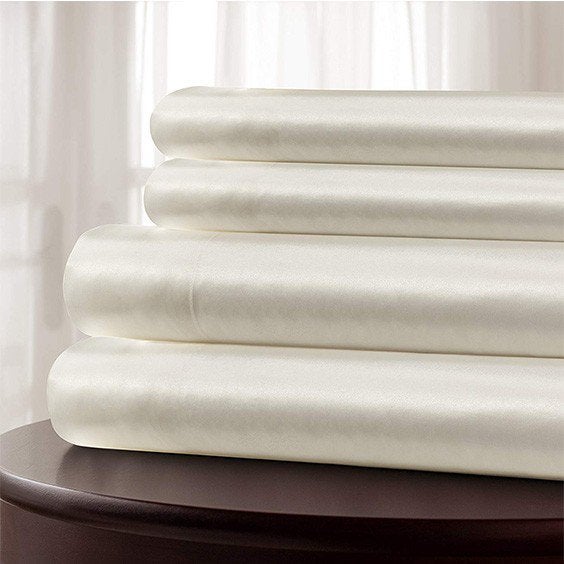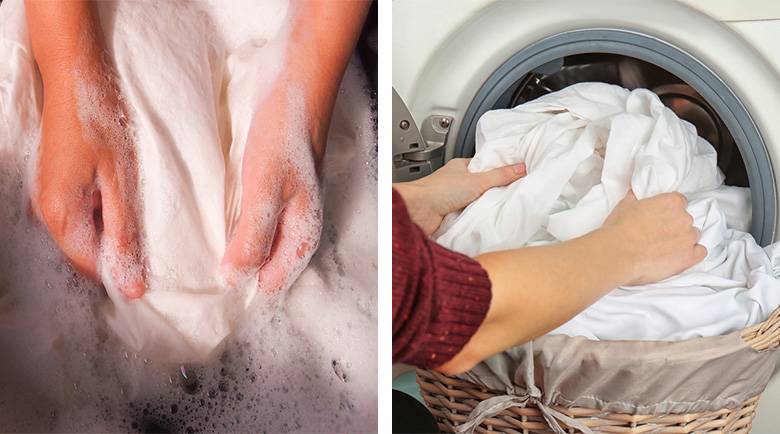You spend approximately one third of your day wrapped up in your bedsheets. What’s out of sight is typically left out of mind, and there’s a plethora of microscopic lifeforms plaguing your sheets when they are left unwashed. Just some of these include:
- Fungal spores
- Pollen
- Animal dander
- Bodily excrement ranging from sweat to the unthinkable
- Skin cells
When you break it down to such an infinitesimal level, it’s kind of gross! You may already be aware of this and wash your sheets every other day. Or, you may neglect this seemingly unimportant household task and only wash your sheets once a month… or less!
Just how often should bedsheets be washed? Are you overdoing it, or is there more you could be doing to keep your restoration hours hygienic? Washing them once a week has been found to be the best practice.
What’s so Important About Weekly Sheet Washing?
Let’s reiterate… there are hordes of bacterium that congregate on your sheets. In the simplest terms possible, you should wash your sheets every week to remove them. Ick factor aside, doing so can improve your health and increase the air quality in your home.
Of course, unexpected things can and do come up. If you just can’t find the time in your schedule to wash your sheets on any given week, the maximum time frame you should allow in-between washings is two weeks. Not only do you remove bacteria and dead skin cells, you even get rid of parasites and mites that feed off you and your loved ones while you rest.
Special Circumstances for More Frequent Washing
Keep in mind that we all face unique life circumstances. In most cases, washing your sheets weekly is acceptable practice. However, there are circumstances that my merit more frequent attention. If you suffer with things like asthma or skin conditions, for example, you may want to wash your sheets more frequently. Speak with your doctor to get a better idea of the measures you should be taking.
Proper Sheet Washing: Are You Doing It Right?
Just as proper form is important during exercise, proper washing techniques are imperative to ensure you maximize the durability of your bedsheets. We have already established that you should be washing them weekly to ensure you are adequately removing dirt, bacteria, and stains. Here are a few other key pointers to keep in mind to make sure you’re not spending your time in vain:
- Wash bed sheets apart from other laundry items to reduce wrinkling and color bleaching.
- Avoid over-drying your sheets to keep materials strong. When dealing with cotton sheets, it’s best to allow them to air dry while they’re still damp.
- Understand the material type your sheets are comprised of.
Throwing your sheets in the washer and calling your weekly sheet-washing obligation complete isn’t enough. You risk wearing out your sheets and having to buy new ones far sooner than you should have to.
Before you read further, take a look at the tag on your sheets and determine what type of fabric they’re made of. Then, read on to determine the proper protocol you should be following.
— Cotton Sheets- Sturdy and Durable
Generally speaking, cotton sheets are sturdy and durable. Thus, they offer a high degree of freedom in washing technique. You can typically machine wash using any water temperature. If you’re ill, it can be a good idea to go with hot water since bacteria can be difficult to eradicate even when submerged. In fact, some strains actually thrive in wet conditions.
TIPS
- Wash lighter colors in cold water to avoid bleaching the material.
- If you can switch the water temperature in your machine mid-cycle, it can be effective to use cold water during the rinse cycle for dark-colored sheets.
- Air dry whenever possible.
— Linen Sheets- Gentler Touch Required
If your sheets are made of linen, you’ll want to take a gentler approach. You should never use hot water as this can lead to weakening of the fabric that creates rips and tears. They respond best to a slightly more detailed approach to laundering:
TIPS
- Hand wash in lukewarm water.
- If hand washing isn’t possible, machine wash in cold or lukewarm water on delicate cycle.
- Air dry.
- If you can’t air dry, machine dry on low heat.
- Fold as soon as possible to reduce wrinkling.
— Flannel Sheets- Go-To During Cold Weather
Flannel is a very soft and cushiony fabric, and it’s perfect for the winter months due to its heat-retaining properties. While it offers much-needed comfort during extreme weather conditions, it also requires you to give back when it comes time to wash:
TIPS
- Pre-treat using ½ cup of vinegar to keep the material from puckering.
- To avoid puckering and rips, don’t combine flannel sheets with other laundry items.
- Machine wash using cool or lukewarm water.
- Wash on delicate cycle.
- You should preferably air dry flannel sheets. However, they can be machine dried on low heat, low tumble setting.
— Silk Sheets- Highly Delicate
Silk is among the most delicate of fabrics. Thus, it requires special care when cleaning. Failure to follow the right regimen will lead to a weakening of its structural integrity, thus reducing strength and damaging texture. Since silk repels allergens, it can be an excellent choice for use by those who suffer with allergies.
TIPS
- Hand wash for the first five washes.
- Always use lukewarm water.
- Always use gentle detergent. Check for products made specifically for use with silk bedding.
- Air dry since high temperatures can shrink and snag the fabric as well as cause white streaks.
- If you can’t air dry, only use low heat.
Silk Sheet- Hand Washing vs. Machine Washing Tips
Since silk is so delicate, let’s elaborate a little bit on machine vs hand washing. This material is very easy to damage, not to mention it’s pricey. It can be costly if you make a senseless cleaning mistake that can be easily avoided.
| Hand Washing | Machine Washing |
|
|
Lasting Fabrics and a More Healthful Home
We like to think we do what we can to maintain our homes. Now that you have a better idea of how often bed sheets should be washed, you can be even more effective in achieving. Not only are you doing your part in reducing harmful bacteria and allergens, but you are also saving money in maintaining your bedsheets and increasing their overall durability.
The biggest takeaway here is to do what you can to wash your sheets weekly, and don’t wait more than two weeks to give them a proper cleaning. The following pointers can increase your effectiveness:
- Look for the right laundry detergent compatible with the type of material you’re washing.
- Don’t stop at bedsheets. You also need to clean your pillow cases, blankets, mattress protector, bed skirts and fitted sheets on a weekly basis.
- Use specialized cleaning sprays based on material type.
- When drying, maintain a clean area. Wet clothes are much more susceptible to contamination, so never do your drying in high-trafficked areas.
The ability to get a proper night’s rest is important to your health, and it can make your days more productive. By properly cleaning your bedsheets, you’re on your way to a happier, healthier life.
Photo credit: theshots.co/Shutterstock; Evgeny Atamanenko/Shutterstock;
DUANGJAN J/Shutterstock; Africa Studio/Shutterstock









